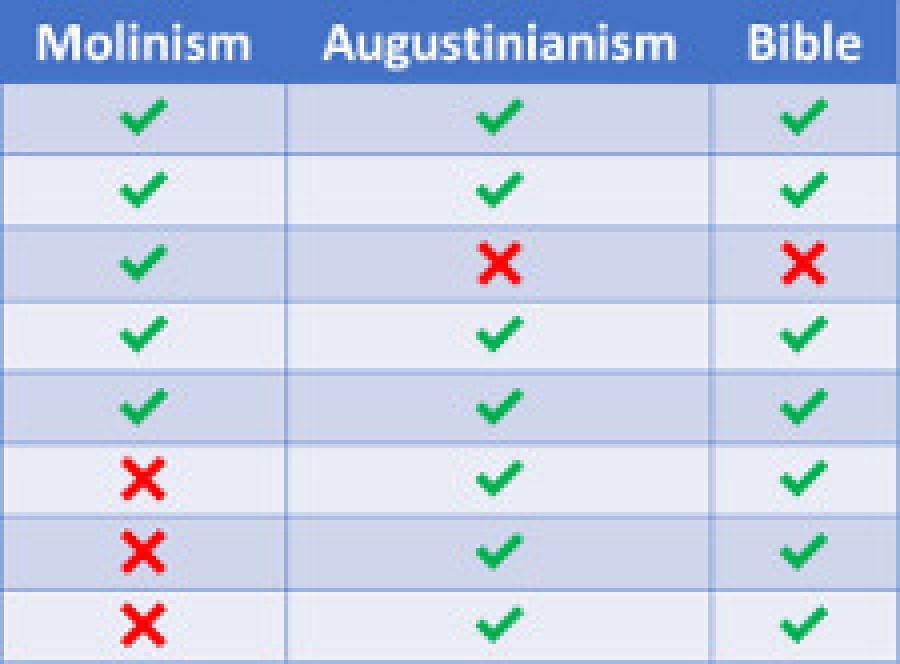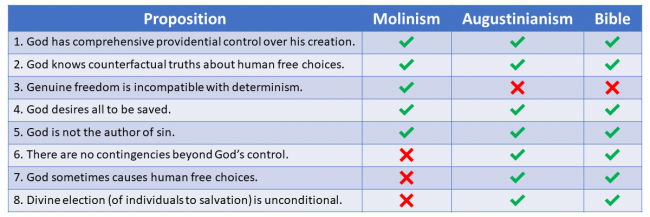How Biblical is Molinism? (Part 6)
Image

Reposted from Analogical Thoughts, with permission. Read the series.
In this highly irregular series of posts, I’ve been considering the question, How well is Molinism supported by the Bible? As I explained in the first installment:
Molinism is a theory that purports to reconcile a robust doctrine of divine providence and foreknowledge with a libertarian view of free will by appealing to the notion of divine middle knowledge: God’s eternal knowledge of the so-called counterfactuals of creaturely freedom, that is, contingent truths about what possible creatures would freely choose if they were created by God and placed in particular circumstances.
I noted that Molinism has been both defended and criticized on both theological and philosophical grounds, and that’s entirely appropriate since it’s a philosophical theory that seeks to reconcile certain theological claims. However, discussions of the purported virtues and vices of Molinism are often conducted at a safe distance from the text of Scripture. (I’ve observed elsewhere that this is a more general shortcoming among analytic/philosophical theologians.) So in this series I’ve endeavored to bring the discussion into closer contact with the more explicit and direct teachings of the Bible. My approach has been to evaluate Molinism alongside what is arguably its leading competitor among orthodox Christian theologians, Augustinianism,1 by considering which of the two views better fits some key “data points” provided by the Bible.2
Over the course of five posts, I identified eight propositions that capture some of the distinctive tenets of Molinism and Augustinianism: either tenets that they share, in contrast to other positions (e.g., Open Theism), or tenets that distinguish them. For each proposition I posed, in effect, three questions:
- Is this proposition affirmed or denied by Molinism?
- Does this proposition distinguish Molinism from Augustinianism? (In other words, does Augustinianism deny what Molinism affirms, or affirm what Molinism denies, on this particular point?)
- Is this proposition positively supported by the Bible?
Here are my conclusions summarized in a simple table:

As you can see, there are:
- Four propositions affirmed by both Molinism and Augustinianism, each of which are supported by the Bible (see parts one, three, and four).
- One proposition affirmed by Molinism over against Augustinianism, but which is not supported by the Bible (see part two).
- Three propositions affirmed by Augustinianism over against Molinism, each of which are supported by the Bible (see part five).
Thus, on the four points that distinguish Molinism from Augustinianism, the Bible (so I have argued) favors the Augustinian position each time.
What conclusions should we draw? Some Molinists take the view that Molinism is more biblical than Augustinianism. More commonly, Molinists will concede that Molinism and Augustinianism are equally biblical (i.e., they are equally consistent with the teachings of the Bible) while insisting that Molinism is philosophically and theologically superior to Molinism. I suggest my analysis here shows that both of these positions are mistaken. There are no biblical teachings that favor Molinism over Augustinianism, but there are a number of biblical teachings that favor Augustinianism over Molinism. Whatever the supposed philosophical virtues of Molinism (a question I’ve only addressed here tangentially) Augustinianism clearly enjoys better biblical credentials.
Notes
1 As I noted in the first post, I’m using the term Augustinianism simply as shorthand for causal divine determinism.
2 See the first post for a brief discussion of what I mean by biblical “data points” and how they can be used to evaluate philosophical theories.
James N. Anderson Bio
Dr. James Anderson is an ordained minister in the Associate Reformed Presbyterian Church. Dr. Anderson came to RTS from Edinburgh, Scotland, and specializes in philosophical theology, religious epistemology, and Christian apologetics. His doctoral thesis at the University of Edinburgh explored the paradoxical nature of certain Christian doctrines and the implications for the rationality of Christian faith. He is Associate Professor of Theology and Philosophy at Reformed Theological Seminary.
- 213 views


Discussion